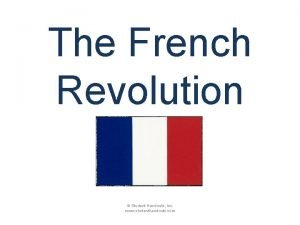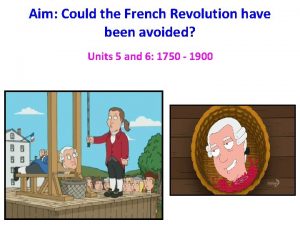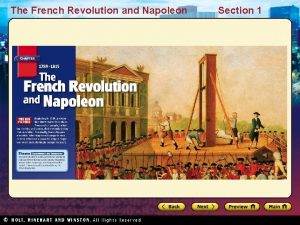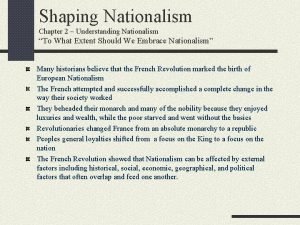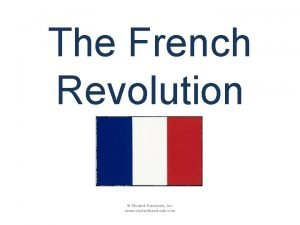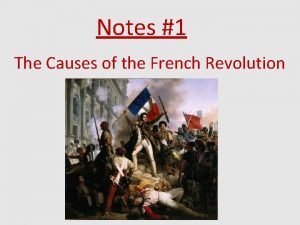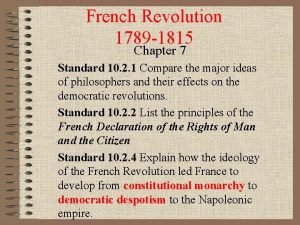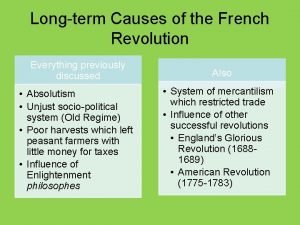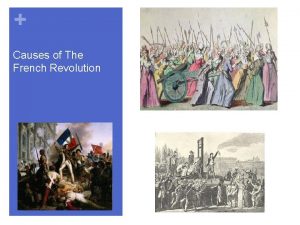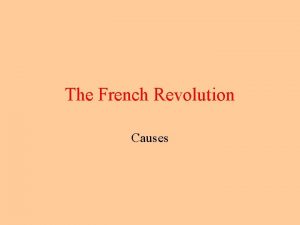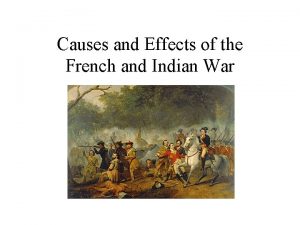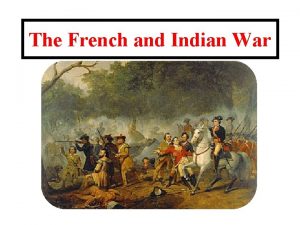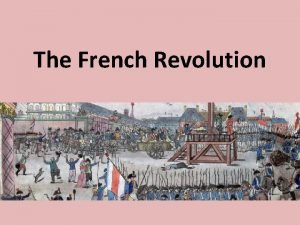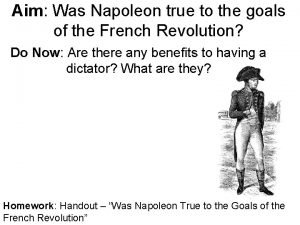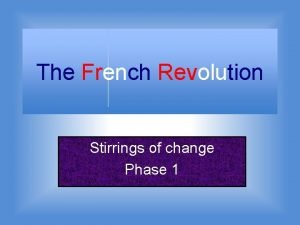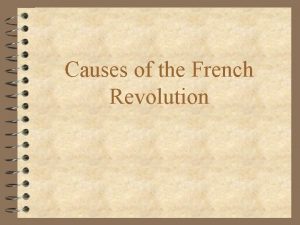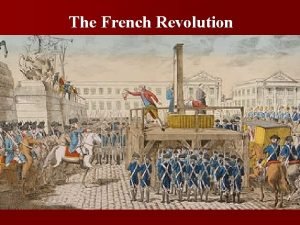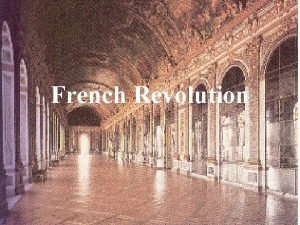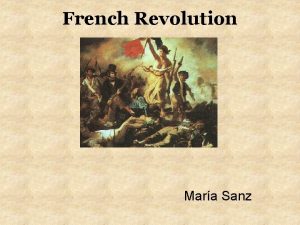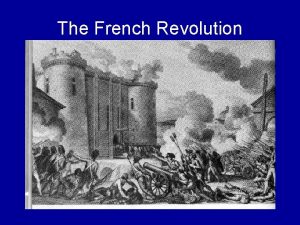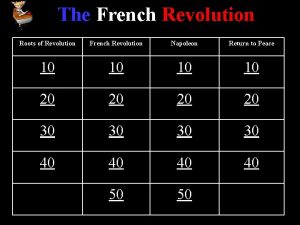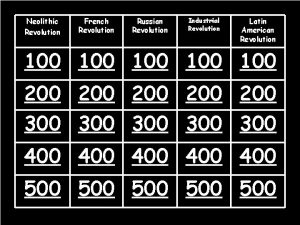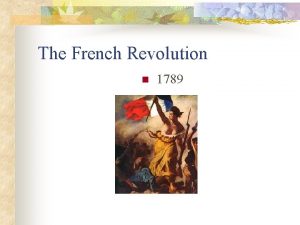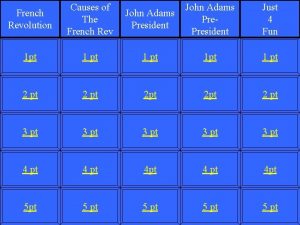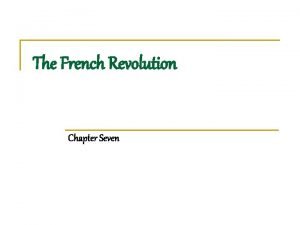The French Revolution Causes of the Revolution Causes





































- Slides: 37

The French Revolution

Causes of the Revolution

Causes of the Revolution �Anger about royal spending � This had been going on for a long time �Example—Louis XIV’s building of Versailles and other actions had put the country in debt � Poor leadership of Louis XVI �He and his wife Marie Antoinette wasted a LOT of money and he didn’t want to collect taxes from the rich people

Causes of the Revolution continued �Class structure—estates (classes) � First Estate=Catholic clergy (1% of the population) �Privileges of clergy—no taxes, no need to adhere to law � Second Estate=aristocrats (2% of the population) � Third Estate=everyone else (97% of the population) �Bourgeoisie—merchants, owners �Sans-culottes—workers �Peasants � The people were angry about inequality �Poverty, hunger, and unemployment

Causes Continued—The Three Estates

Causes Continued �Enlightenment ideas � Social contract � Natural Rights � British tradition of holding their king accountable to Parliament since the Magna Carta in 1215 �American Revolution, 1775 -1783 � French helped the Americans win AND were inspired by the victory � Declaration of Independence was particularly inspirational https: //www. youtube. com/watch? v=w. Xs. Zbkt 0 yqo

Stage 1: National Assembly in Charge

Stage 1: Calling of the Estates-General (French legislature), 1789 -1792 � French Legislature meets � Nobles wanted the Estates -General to approve new taxes for the Third Estate to have to pay � Louis called them to meet in spring 1789 � Had not met in 175 years – wow! � People expected reforms, but the First and Second Estates could always outvote the Third Estate

Stage 1: Estates-General Continued � June 17, 1789—once they are together, the Third Estate declared itself a National Assembly and refused to vote by old, unfair method � Louis XVI reacted and locked the Third Estate out of the meeting room!

Stage 1: Estates General Continued �June 29, 1789: The Tennis Court Oath (no, I am not kidding!) � The Third Estate went to the tennis court and swore that they wouldn’t leave without writing a new constitution �Louis then agrees that each man may vote in the legislature, but he brings extra military into Paris because he feels vulnerable � It is too late, the revolution in already in motion

Stage 1: The Great Fear, Summer 1789 �Peasants believe that the upper class is going to destroy them, therefore, they � Start attacking fancy houses and destroying property � Storm the Bastille prison—July 14, 1789 �In response, the National Assembly � Issues the “Declaration of the Rights of Man and Citizen” (see separate slide) � Abolishes any leftover parts of feudalism in France

Stage 1: “Declaration of Rights of Man and Citizen” Written by the National Assembly �Inspired by—English Bill of Rights, Declaration of Independence, and Enlightenment thinkers �Included freedom of speech, press, and religion for all men �Women not included—Olympe de Gouges wrote a version that included women � She was later executed

Stage 1: Revolution Gains More Power �October, 1789— 7, 000 women marched from Paris to Versailles, protesting lack of bread �Royal family moved from Versailles to Tuileries palace in response—basically, house arrest! �This made revolutionaries bolder

Stage 1: Revolution Gains More Power �National Assembly wrote the Civil Constitution of the Clergy, a way to decrease the power of the Catholic Church � Took Church land sold it � Said priests were just regular people

Stage 1: Revolution Gains More Power � 1791—New Constitution was ready—constitutional monarchy � Louis had MUCH less power � ½ of adult men can vote � Louis and Marie try to flee to Austria —bad idea! They get locked up in prison � France declares war on Austria and Prussia

Stage 1: Revolution Gains More Power �Shortly thereafter. . . � National Assembly decides that it needs to form a new body to run the revolution called the National Convention � Radical forces will now be in charge. . .

Stage 2: The Convention, 1792 -1795

Stage 2: The Convention � Forms Committee on Public Safety � Creates new court to try enemies of the revolution � Drafts men 18 -45 to win the war � Created metric system, new calendar, etc.

Stage 2: The Reign of Terror �Decides to kill the king—trial, guillotine � January 21, 1793 � Reaction of the rest of Europe � France is now a representative democracy �Jacobins v. Girondists: political groups � Jacobins led the government from 1793 -1794; they were more radical than the Girondists, who they pushed out of power in 1793 �led by Robespierre

Stage 2: Reign of Terror �Girondists were the first victims of the Terror �Robespierre sent Danton to the guillotine and then was sent himself on July 27, 1794

Stage 2: Effects of the Terror �Terror lasted 10 months— 300, 000 arrested, 17, 000 killed �Instead of strengthening the revolution, it weakened it �Decreased international support for the revolution �People all over Europe are scared. . .

Stage 3: Directory, 1795 -1799

Stage 3: Another New Constitution �Revolutionaries create a new government—the Directory � Five leaders were in charge AND � Two-part legislature �Council of Ancients �Council of Five Hundred

Stage 3: Another New Constitution �It was a republic, but the war was causing unrest � Only property owners could vote � Weak government that accomplished little � Power vacuum led to more than one coup d’etat (takeover of the government) � 1799—A group of supporters push the Directory to name Napoleon leader—coup d’etat � Napoleon is now in charge. . .

Stage 4: Napoleonic Era, 17991815

Stage 4: Napoleon �Background � Very ambitious � Military skill �He had attended military school �Fought in war against Europe � Successes in Toulon, Austria, Paris � Directory appointed him in charge of fighting in Italy � He won battles, gained territory AND won the respect of his men

Stage 4: Napoleon’s Dictatorship �Consulate— 3 leaders, Napoleon first consul � Actually, Napoleon had all of the power � He promised to do some of what the revolutionaries wanted �Why did the people let him become dictator? � Citizens were scared during Revolution and wanted safety � Napoleon made promises � Citizens did not want another king

Emperor Napoleon �Plebiscite to French people to get support for his desire to be emperor �Napoleonic Wars � Continuation of wars during Revolution that reflected Napoleon’s desire to rule Europe � British nemesis �British defeated Napoleon at Battle of Trafalgar in 1805 �More successful on land

Stage 4: Emperor Napoleon �In 1804, Napoleon declared himself emperor, and during this time, he � Started the Continental System �It was a blockade designed to hurt British trade, but it was ineffective because British ships got through anyway � Peninsular war (Portugal and Spain) � Put relatives in positions of power

Stage 4: Napoleon’s Domestic Policies �Concordat (agreement) with Pope �National Bank �Better tax system �Napoleonic Code (see later slide) �Established schools �Supported revolutionary ideas � equality before the law � representative government �Growth of nationalism

Effect of Napoleonic Wars

Stage 4: Napoleon’s Achilles Heel-Russia � 1812—Napoleon invades Russia � He thought that Czar Alexander I was conspiring with Britain � Russians retreat and burn everything in their path so Napoleon’s soldiers had no supplies/food � Napoleon took 600, 000 soldiers to capture Moscow � Only 20, 000 soldiers survived

Stage 4: Napoleon’s Exile �After Napoleon lost in Russia, he is exiled to Elba �In 1815, he escaped, went back to France and ruled for 100 days until he lost to the British at Waterloo and was exiled to St. Helena

Stage 4: Napoleon’s Contributions �Military—created an empire �Peace—brought peace to war-torn France �Church—mended fences with the Church after the horrible treatment it received during the Revolution �Napoleonic Code � Protected property � Equal rights of adult males � Males are the head of households � Other countries model their law codes on this document

Aftermath: Napoleon’s Problematic Actions �Although he provided a feeling of safety for his people, he did not believe in � Intellectual freedom � Representative government �Censorship � Limited freedom of speech and press � Secret police arrested his enemies—he had some killed � Used propaganda to get his subjects to believe his point of view � Ignored the legislature

Aftermath: Congress of Vienna— 18141815 �Countries present: Russia, Prussia, Austria, Britain, and France �Leader—Metternich (Austria) �Goals— � to balance the power of the countries in Europe so that no one country can gain all of the power like Napoleon tried to � decrease nationalist tendencies � prevent other revolutions

Aftermath: Congress of Vienna— 18141815 �Effects: � Monarchs forcefully rejected revolutions during the 19 th century � European powers successfully avoided war until WWI
 French revolution causes and effects
French revolution causes and effects Short term causes of the french revolution
Short term causes of the french revolution French revolution summary
French revolution summary The causes of the french revolution
The causes of the french revolution Causes and effects of french revolution
Causes and effects of french revolution Causes and effects of the french revolution
Causes and effects of the french revolution French revolution causes
French revolution causes Outcome of french revolution
Outcome of french revolution Immediate cause of french revolution
Immediate cause of french revolution Could the french revolution have been avoided
Could the french revolution have been avoided French
French Committee of public safety
Committee of public safety Causes of the french revolution essay
Causes of the french revolution essay French revolution
French revolution Political causes of french revolution
Political causes of french revolution Long term causes french revolution
Long term causes french revolution French revolution causes and effects
French revolution causes and effects 5 causes of the french revolution
5 causes of the french revolution Short term causes french revolution
Short term causes french revolution The causes of the french revolution
The causes of the french revolution French revolution causes
French revolution causes Describe the causes of french revolution
Describe the causes of french revolution Russian revolution vs french revolution
Russian revolution vs french revolution Aunt flossie's hats
Aunt flossie's hats Causes and effects of the french and indian war
Causes and effects of the french and indian war What were the causes of the french and indian war
What were the causes of the french and indian war French and indian war
French and indian war Causes of french and indian war
Causes of french and indian war Main events of the french revolution
Main events of the french revolution Napoleon's goals
Napoleon's goals October 6 1789 french revolution
October 6 1789 french revolution French revolution recipe
French revolution recipe The french revolution
The french revolution Objectives of french revolution
Objectives of french revolution Rosetta stone french revolution
Rosetta stone french revolution French revolution political spectrum
French revolution political spectrum Immediate cause of french revolution
Immediate cause of french revolution French revolution graphic organizer
French revolution graphic organizer

